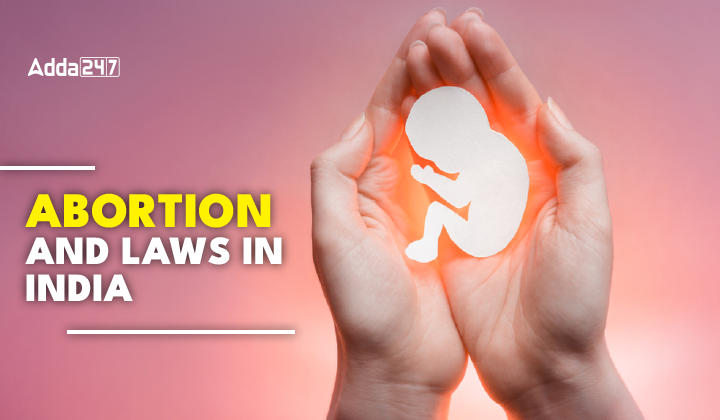Table of Contents
Context: An overview of the abortion laws in India: reevaluations and discussions in the legal field.
About Abortion in India
Abortion, as defined by India’s Ministry of Health and Family Welfare, is the intentional cessation of a pregnancy before the fetus can live independently.
Status in India
The Indian government’s laws and regulations govern both natural miscarriages and induced abortions for medical, social, or personal reasons. Abortion has been legal since 1971 under the Medical Termination of Abortion (MTP) Act. The scope of abortion laws has evolved over the years, with recent reforms expanding access to legally safe abortion procedures
- In India, there are about 7 million abortions performed every year. Approximately half of all abortions are deemed illegal.
- Abortion: The intentional ending of a pregnancy, usually carried out in the first 20–24 weeks following conception.
- The Medical Termination of Pregnancy Act, 1971 (MTPA Act) is an Indian statute that establishes the parameters for when an abortion is permissible in the nation.
- Foeticide is the deliberate killing of a fetus; it is frequently connected to unethical and illegal methods of sex-selective abortion.
Medical Termination of Pregnancy Act of 1971
Advances in medical science because of its commitment to universal access to reproductive health services, India amended the Termination of Pregnancy Treatment (MTP) Act of 1971.
- Discontinuation due to ineffective contraceptive method or device: If a contraceptive method or device fails, married women can terminate the pregnancy for up to 20 weeks.
- It also extends the provision to unmarried women, allowing them to get pregnant for the same reason.
- An amended Act known as The MTP Amendment Act 2021 aims to expand the scope of safe and legal availability of abortion services based on diversity.
- Opinion Needed for Termination of Pregnancy: The opinion of one Registered Medical Practitioner (RMP) is required for termination of pregnancy up to 20 weeks of gestation.
- It mandates the opinion of two RMPs on termination of pregnancy between 20-24 weeks of gestation.
- For severe fetal abnormalities, termination of pregnancy after 24 weeks requires the opinion of a state medical board.
- Upper Gestation Limit for Special Categories: Raises the upper pregnancy limit from 20 weeks to 24 weeks for rape survivors, incest victims, and other vulnerable women (such as heterosexual women). power, minors, etc.).
- Privacy: The name and other details of a woman who has had a termination of pregnancy cannot be disclosed, except to someone authorized by existing law, to ensure confidentiality.
Abortion in India Challenges
- Worldwide:
- Human Rights Perspective: Restrictive abortion laws can violate women’s rights, including privacy, non-discrimination, and equality.
- U.S. Roe v. United States Wade: In 1973, the U.S. The landmark Supreme Court case allowed abortion until the fetus was viable. Recent restrictions on abortion in the U.S. have raised concerns about privacy, autonomy, and gender-based violence.
- Late abortions: Historically, courts have allowed late abortions in cases of rape or consensual sex.
- India:
- Legal Framework: The Indian Termination of Pregnancy Treatment (MTP) Act allows abortion in three modes:
- 20 weeks on doctor’s advice.
- By the opinion of two registered physicians in a particular case between 20 and 24 weeks.
- After 24 weeks, the medical board assesses termination of pregnancy based on gross fetal abnormalities.
- Liberal approach: Indian law is considered liberal and pro-choice, and generally favors women’s liberation.
- Legal Framework: The Indian Termination of Pregnancy Treatment (MTP) Act allows abortion in three modes:
Way forward
Empowering Women:
- Education and Awareness:
- Public Awareness Campaigns: Start all-encompassing initiatives to inform families, women, and medical professionals about safe abortion practices, their rights, and the resources that are accessible.
- Curriculum for Schools: Introduce age-appropriate sex education in schools, stressing reproductive health, contraception, and abortion rights.
- Access to Services:
- Expanding Access: Make certain that both urban and rural communities have access to safe abortion services. Establish more clinics and services, especially in disadvantaged locations.
- Encourage telemedicine services for follow-up treatment, counseling, and medical consultations, particularly in light of the current pandemic.
- Reducing Stigma and Discrimination:
- Community Connections: Engage with community leaders, religious organizations, and influential community members to reduce abortion.
- Legal protections: Strengthen legal protections against discrimination based on abortion history.
- Involvement of Men and Families:
- Men’s Role: Assist their partners’ decisions and urge men to take an active part in conversations around reproductive health.
- Family Support: Foster an atmosphere where women feel at ease discussing their reproductive options.
Conclusion
India’s revised MTP Act aims to make abortion safer and more accessible. Expanding comprehensive abortion care enables women to make informed decisions about their reproductive health.



 TSPSC Group 1 Question Paper 2024, Downl...
TSPSC Group 1 Question Paper 2024, Downl...
 TSPSC Group 1 Answer key 2024 Out, Downl...
TSPSC Group 1 Answer key 2024 Out, Downl...
 UPSC Prelims 2024 Question Paper, Downlo...
UPSC Prelims 2024 Question Paper, Downlo...
